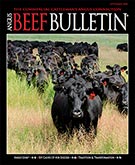Tax Reform and You
The good, the bad and the ugly of new tax rules for farmers and ranchers.
Enactment of the first major tax reform package in 30 years includes a number of changes that will affect farmers and ranchers. Estate and succession planner Michael McCormack, with Lincoln Agri Business Services, talked about the good, the bad and the ugly implications of new tax laws in a Learning Lounge presentation conducted during the 2018 Cattle Industry Convention Jan. 31-Feb. 2 in Phoenix, Ariz.
McCormack said a significant change, and a good one, is the new permanent 21% corporate tax rate designed to stimulate corporate investment and creation of jobs. However, most farm and ranch business entities are not incorporated. For those, seven expanded tax brackets apply, representing moderately lower tax rates.
McCormack explained the increase in standard deductions to $12,000 for individuals and to $24,000 for married couples filing jointly. Another good thing is that “pass-through” businesses, including sole proprietors and partnerships, will be able to deduct 20% of their business income, which includes payments from cooperatives, commodity wages and farmland rental income.
Still more good is found in the improved ability to make capital investments. The new law permanently increases the amount of expenditures that can be deducted using Section 179 small business expensing from $500,000 to $1 million. “Bonus depreciation” will allow farmers and ranchers to fully write off equipment expenses in the same year they are put into service.
Among the bad changes to tax code are limits to certain deductions. McCormack said deductions for state and local property and sales taxes are capped at $10,000 per year. Mortgage deductions are capped at $750,000.
“A really big win for American farmers and ranchers is the estate tax reduction,” stated McCormack. “The individual exemption has been increased to $11.2 million, and for a married couple it’s $22.4 million.”
However, McCormack said an ugly consequence of these changes is that it creates a false sense of security. Some people have the mistaken impression that they don’t have to worry about estate or business succession planning.
McCormack emphasized that, with the exception of the 21% corporate tax, all new changes revert to former rates after December 2025. He advised the audience to use the next eight years to implement sound planning.
Even if they have plans in place, changes in tax law, individual operations and family dynamics may need to be addressed. McCormack said a variety of tools are available for customizing estate and business succession plans for individual operations.
“It’s a common mistake to think, ‘We’re all set,’ ” warned McCormack. “Plans need to be reviewed and updated periodically.”

Editor’s Note: Troy Smith is a freelance writer and cattleman from Sargent, Neb. This article was written as part of Angus Media’s coverage of the 2018 Cattle Industry Convention and is copyrighted. See additional coverage distributed through Angus Media channels including the Angus Journal, Angus Beef Bulletin, Angus Beef Bulletin EXTRA, The Angus Report and online at www.angus.org.






